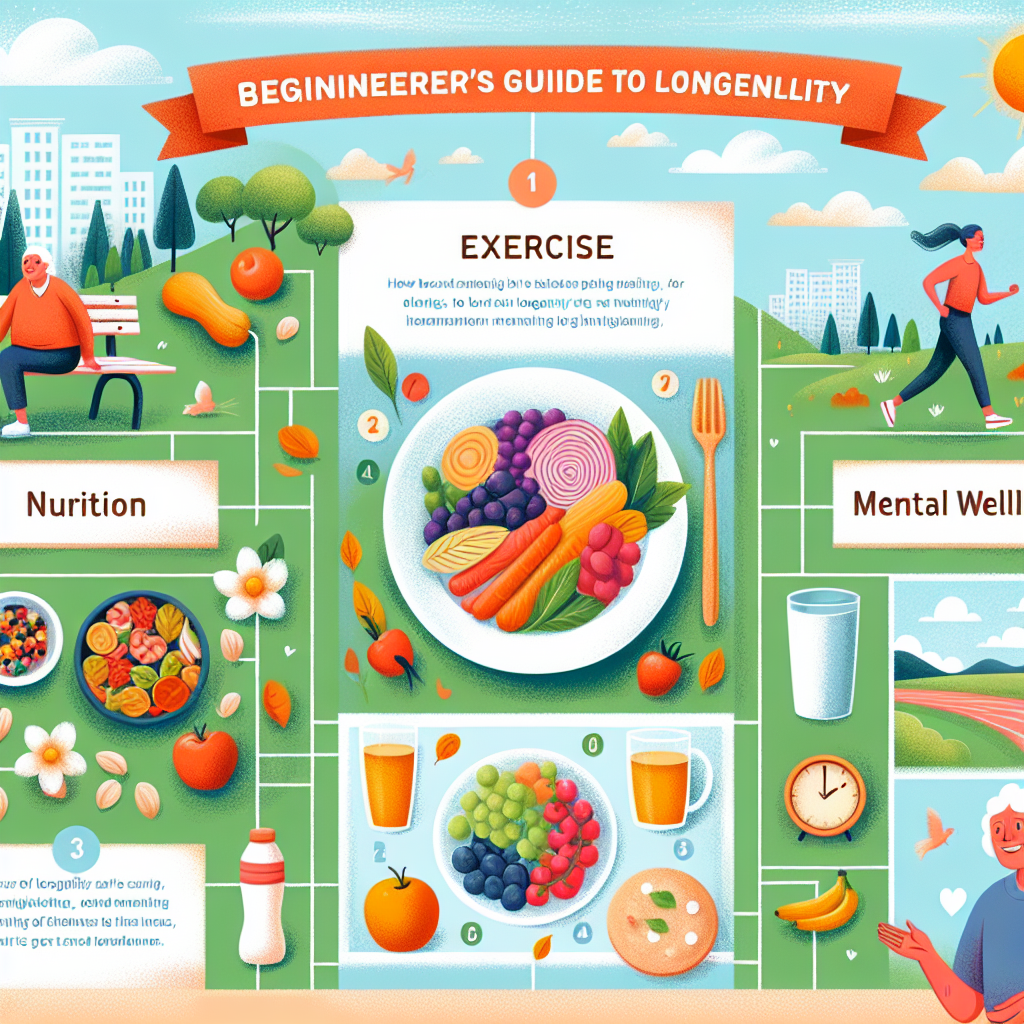Beginner’s Guide to Longevity

Discover the secrets to a longer, healthier life with our Beginner’s Guide to Longevity. Start your journey towards vitality today! Click here to learn more.
Understanding the Basics: A Beginner’s Guide to Longevity
Longevity, the term often associated with a long and healthy life, has been a subject of fascination for many. It is a complex concept that intertwines genetics, lifestyle, and environment, and understanding its basics can be a stepping stone towards achieving a healthier and longer life.
To begin with, it is essential to understand that longevity is not merely about living for a large number of years. It is about maintaining a high quality of life throughout those years. This involves not just physical health, but also mental and emotional well-being. The goal is to age gracefully, maintaining vitality and independence as long as possible.
Genetics plays a significant role in longevity. Some people are genetically predisposed to live longer due to certain genes that protect against diseases and aging. However, it’s important to note that genetics only accounts for about 20-30% of an individual’s potential lifespan. The remaining 70-80% is influenced by lifestyle and environmental factors.
Lifestyle choices are critical in determining longevity. A balanced diet, regular exercise, adequate sleep, and stress management are all key components of a lifestyle conducive to longevity. A diet rich in fruits, vegetables, lean proteins, and whole grains, coupled with regular physical activity, can significantly reduce the risk of chronic diseases such as heart disease, diabetes, and certain types of cancer. Adequate sleep and stress management techniques like meditation and yoga can improve mental health and boost immunity, further contributing to longevity.
Environmental factors also play a crucial role in longevity. Clean air, access to healthcare, and a supportive social network can significantly impact an individual’s lifespan. Studies have shown that people who live in environments with less pollution, better healthcare facilities, and strong social support tend to live longer.
While understanding these factors is important, it’s equally crucial to recognize that longevity is not a one-size-fits-all concept. What works for one person may not work for another. Therefore, it’s essential to tailor your approach to longevity based on your unique genetic makeup, lifestyle, and environment.
Moreover, it’s important to remember that longevity is a journey, not a destination. It’s about making small, sustainable changes to your lifestyle that can have a big impact over time. It’s not about drastic changes or quick fixes. It’s about consistency and commitment to a healthier lifestyle.
In conclusion, longevity is a multifaceted concept that involves genetics, lifestyle, and environment. While genetics plays a role, the majority of your lifespan is determined by your lifestyle and environment. By understanding these factors and making conscious choices to improve your health, you can increase your chances of living a long and healthy life. Remember, the journey to longevity is a marathon, not a sprint. It’s about making consistent, sustainable changes that will benefit you in the long run. So, start today, make small changes, and embark on your journey to longevity.
Essential Tips for Longevity: A Comprehensive Guide for Beginners

Longevity, the art of living a long and healthy life, is a topic that has fascinated humans for centuries. As we continue to make advancements in medicine and technology, the possibility of extending our lifespan becomes more and more feasible. However, longevity is not just about living longer; it’s about living better. It’s about maintaining our physical health, mental acuity, and emotional well-being as we age. This beginner’s guide to longevity will provide you with essential tips to help you embark on your journey towards a longer, healthier life.
First and foremost, it’s important to understand that longevity is not a destination, but a journey. It’s a lifestyle choice that requires commitment and consistency. It’s about making small, incremental changes to your daily habits and routines that will have a profound impact on your overall health and well-being in the long run.
One of the most critical factors in achieving longevity is maintaining a healthy diet. Consuming a balanced diet rich in fruits, vegetables, lean proteins, and whole grains can significantly reduce the risk of chronic diseases such as heart disease, diabetes, and cancer. Additionally, limiting the intake of processed foods, sugars, and unhealthy fats can further enhance your health and longevity.
Physical activity is another crucial component of longevity. Regular exercise not only helps to maintain a healthy weight but also improves cardiovascular health, strengthens the immune system, and boosts mental health. It’s recommended to engage in at least 30 minutes of moderate-intensity exercise most days of the week. This could include activities such as walking, cycling, swimming, or even gardening.
In addition to diet and exercise, maintaining good mental health is equally important for longevity. Chronic stress, anxiety, and depression can take a significant toll on our physical health and shorten our lifespan. Therefore, it’s essential to incorporate stress management techniques such as meditation, yoga, or deep breathing exercises into your daily routine.
Furthermore, maintaining strong social connections can also contribute to longevity. Numerous studies have shown that individuals with strong social networks tend to live longer than those who are isolated. Engaging in social activities, volunteering, or simply spending time with loved ones can significantly improve your emotional well-being and longevity.
Lastly, regular health check-ups are vital in detecting any potential health issues early. Regular screenings for blood pressure, cholesterol, glucose levels, and certain types of cancer can help in early detection and treatment, thereby increasing your chances of living a longer, healthier life.
In conclusion, longevity is a multifaceted concept that involves a combination of healthy eating, regular physical activity, stress management, social engagement, and regular health check-ups. It’s about making conscious choices every day that will contribute to your overall health and well-being. Remember, it’s never too late to start making these changes. Every small step you take towards a healthier lifestyle is a step towards longevity. So, start your journey today and embrace the art of living a long, healthy life.
Starting Your Journey to a Longer Life: A Beginner’s Guide to Longevity
The quest for longevity, the desire to live a longer, healthier life, is a universal aspiration. It is a journey that requires commitment, discipline, and a deep understanding of the factors that contribute to a longer lifespan. This beginner’s guide to longevity will provide you with the necessary insights to start your journey towards a healthier and longer life.
Longevity is not merely about adding years to your life. It is about enhancing the quality of those years through healthy habits and lifestyle changes. The first step towards longevity is understanding the importance of a balanced diet. Consuming a diet rich in fruits, vegetables, lean proteins, and whole grains can significantly reduce the risk of chronic diseases such as heart disease, diabetes, and cancer. These foods are packed with essential nutrients that help to maintain optimal body function and slow down the aging process.
In addition to a balanced diet, regular physical activity is another crucial factor in promoting longevity. Exercise not only helps to maintain a healthy weight but also improves cardiovascular health, strengthens the immune system, and boosts mental health. It is recommended to engage in at least 30 minutes of moderate-intensity exercise most days of the week. This could include activities such as walking, cycling, swimming, or even gardening.
While diet and exercise are fundamental to longevity, it is equally important to pay attention to mental health. Chronic stress, anxiety, and depression can take a toll on your physical health and shorten your lifespan. Therefore, incorporating stress management techniques such as meditation, yoga, or deep-breathing exercises into your daily routine can significantly improve your mental health and contribute to longevity.
Another key aspect of longevity is maintaining strong social connections. Numerous studies have shown that individuals with strong social networks tend to live longer than those who are isolated. Engaging in social activities, volunteering, or simply spending time with loved ones can enhance your emotional wellbeing and add years to your life.
Sleep, often overlooked, is a vital component of longevity. Lack of sleep can lead to a host of health problems including obesity, heart disease, and even premature death. It is recommended to aim for seven to nine hours of sleep per night to allow your body to rest, repair, and rejuvenate.
Lastly, regular health check-ups are essential in the journey towards longevity. Early detection of health issues can lead to more effective treatment and prevent serious complications. Therefore, it is important to schedule regular visits with your healthcare provider and stay up-to-date with recommended screenings and vaccinations.
In conclusion, the journey to longevity is a holistic process that involves a balanced diet, regular physical activity, mental health care, strong social connections, adequate sleep, and regular health check-ups. It is a lifelong commitment that requires consistency and discipline. However, the rewards of a longer, healthier life are well worth the effort. Remember, it’s never too late to start your journey towards longevity. Every small step you take today can make a significant difference in your health and lifespan in the future. So, start today, and embrace the journey to a longer, healthier life.